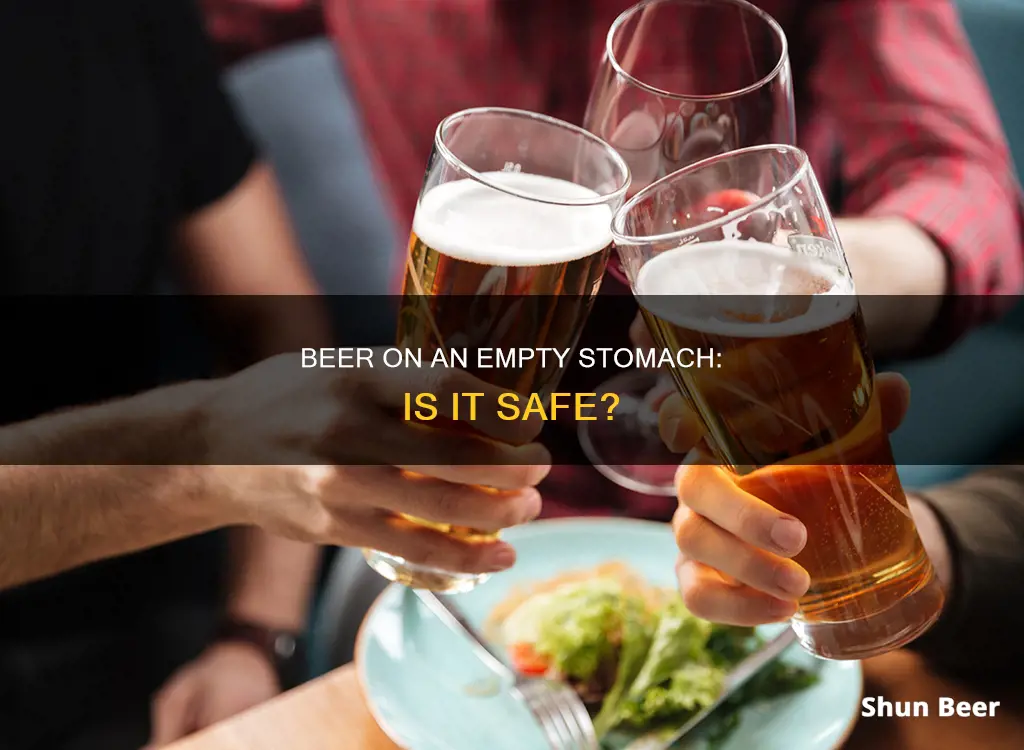
Drinking beer, or any alcoholic beverage, without eating is a common practice. Some people believe that drinking on an empty stomach is the best and most reasonable way to drink, as it allows them to feel the effects of alcohol faster and save money. However, it is important to note that drinking on an empty stomach can have negative consequences. Alcohol is absorbed more quickly into the bloodstream when there is no food in the stomach to slow down its absorption. This can lead to dangerous levels of alcohol in the system, causing side effects such as dizziness, nausea, vomiting, loss of motor skills, and mood swings. Additionally, drinking without eating can increase the risk of gastritis and other stomach problems. While there is limited evidence that eating while drinking improves short-term health outcomes, it is generally recommended to eat before consuming alcohol to mitigate the negative effects of drinking on an empty stomach.
| Characteristics | Values |
|---|---|
| Effect on blood alcohol level | Higher |
| Effect on intoxication | More likely |
| Effect on stomach | Hurts, may cause gastritis |
| Effect on liver | Takes a toll |
| Effect on kidneys | Takes a toll |
| Effect on cardiovascular system | Takes a toll |
| Effect on digestive track | Takes a toll |
| Effect on risk of esophageal cancer | Higher |
| Effect on the rate of alcohol absorption | Faster |
| Effect on the rate of reaching unsafe alcohol levels | Faster |
| Effect on the risk of alcohol poisoning | Higher |
What You'll Learn
- Drinking on an empty stomach can lead to faster intoxication
- It can cause gastritis and other stomach problems
- It can lead to immediate health effects like loss of coordination and reduced responsiveness
- It can be dangerous, causing sudden spikes in blood alcohol concentration
- It can increase the risk of esophageal cancer

Drinking on an empty stomach can lead to faster intoxication
The rate at which alcohol is absorbed into the bloodstream is a crucial factor in determining the effects of drinking on an empty stomach. On an empty stomach, the body can absorb up to 80% of the alcohol in a drink within minutes. This rapid absorption leads to a sharp rise in blood alcohol concentration, which can have unpleasant and toxic side effects. These effects include dizziness, nausea, vomiting, disinhibition, loss of motor skills, mood swings, and risky sexual behaviors.
Additionally, drinking on an empty stomach can also take a toll on your liver, kidneys, cardiovascular system, and digestive tract. The higher concentration of alcohol in the stomach can lead to gastritis, or irritation and inflammation of the stomach lining. In severe cases, this can cause internal bleeding and be life-threatening.
It's important to note that the absence of food in the stomach also affects the type of drink you are consuming. Carbonated alcoholic drinks, such as champagne or mixed cocktails, can be absorbed even faster due to the presence of carbon dioxide. Stronger alcoholic drinks with higher alcohol content are also associated with a more rapid rise in blood alcohol level.
While drinking on an empty stomach may not be inherently dangerous for everyone, it is crucial to be aware of the potential risks and to drink in moderation. It is always advisable to eat something before drinking to slow down the absorption of alcohol and mitigate the negative consequences. By consuming food, especially carbohydrates, you can significantly reduce the rate of alcohol absorption and lower the peak blood alcohol concentration. This will not only make your drinking experience more enjoyable but also safer.
The British Beer Myth: Warm or Cold?
You may want to see also

It can cause gastritis and other stomach problems
Drinking beer without eating can cause gastritis and other stomach problems. This is due to the irritation and inflammation of the stomach lining, which can lead to internal bleeding and even be life-threatening in severe cases. The higher the concentration of alcohol consumed, the more likely one is to develop gastritis. Additionally, the act of vomiting due to excessive drinking can further irritate the stomach lining and contribute to gastritis.
The risks of drinking on an empty stomach are heightened when consuming beverages with a high alcohol content, such as shots, or drinking quickly and excessively. These factors cause a rapid increase in blood alcohol level, which can lead to a spike in intoxication and dangerous side effects. Binge drinking on an empty stomach can lead to faster intoxication and unpleasant, toxic side effects.
To prevent gastritis and other stomach problems when drinking without eating, it is recommended to drink in moderation and be mindful of personal alcohol tolerance. Drinking too much or too quickly can lead to alcohol poisoning, which requires immediate medical attention. It is also important to avoid drinking when taking certain medications, such as opioids, as this can further increase the risks.
While drinking on an empty stomach may not seem like a big deal, it is crucial to understand the potential risks involved. By drinking in proportion to your personal tolerance and being mindful of the amount and speed of consumption, you can help mitigate the chances of developing gastritis and experiencing other stomach-related issues.
Alcohol-Free Beer and Gout: Is It Safe to Drink?
You may want to see also

It can lead to immediate health effects like loss of coordination and reduced responsiveness
Drinking beer on an empty stomach can lead to immediate health effects like loss of coordination and reduced responsiveness. This is because drinking on an empty stomach increases the rate at which alcohol is absorbed into the bloodstream. With no food in the stomach, alcohol passes quickly through to the small intestine, where it is immediately absorbed into the bloodstream through epithelial cells. From there, it is carried by blood vessels throughout the body and brain, eventually reaching the liver. This process happens much faster than the body can metabolize the alcohol.
The absence of food in the stomach also speeds up the metabolization process of alcohol, especially when consuming beverages with 20% to 30% alcohol content. On an empty stomach, the body can absorb alcohol at a faster rate than it can break it down, leading to sudden spikes in blood alcohol concentration. This can result in dangerous and potentially toxic side effects.
Binge drinking on an empty stomach can lead to faster intoxication and immediate health effects such as loss of coordination, reduced responsiveness, uncontrolled eye movements, and inability to speak coherently. It can also cause tachycardia, or a rapid heartbeat. These physical effects can impair judgment and decision-making abilities, increasing the risk of engaging in risky behaviors such as drunk driving or unsafe sexual activities.
To minimize the negative side effects of drinking on an empty stomach, it is important to drink in proportion to your personal tolerance for alcohol, avoid drinking when taking certain medications, and avoid drinking too much or too quickly. It is also crucial to watch out for signs of intoxication and alcohol poisoning, such as difficulty balancing or walking, and seek immediate medical attention if necessary.
Americans' Beer Consumption: How Much is Too Much?
You may want to see also

It can be dangerous, causing sudden spikes in blood alcohol concentration
Drinking beer without eating can be dangerous, causing sudden spikes in blood alcohol concentration. When you drink on an empty stomach, the alcohol passes quickly through your stomach and enters your small intestine, where it is immediately absorbed into your bloodstream. This rapid absorption leads to a sharp rise in your blood alcohol level, which can have unpleasant and toxic side effects.
The absence of food in your stomach accelerates the absorption of alcohol. Your stomach lining swiftly absorbs about 20% of the alcohol, while the remaining 80% goes through your small intestine. In contrast, when you have food in your stomach, your body absorbs alcohol more slowly. This is because the pyloric sphincter, a valve that connects your stomach and small intestine, closes when you're digesting a meal. This keeps the food in your stomach longer, allowing stomach acid to help break it down. With the pyloric sphincter closed, alcohol can't enter the small intestine right away, resulting in slower absorption into the bloodstream.
Drinking a large amount of alcohol on an empty stomach can significantly and rapidly raise your blood alcohol level, leading to dangerous levels of intoxication. This can cause side effects such as dizziness, nausea, vomiting, disinhibition, loss of motor skills, mood swings, and risky sexual behaviours. It can also lead to gastritis and other stomach problems related to excess stomach acid.
Additionally, drinking on an empty stomach can take a toll on your liver, kidneys, cardiovascular system, and digestive tract. It is crucial to drink in proportion to your personal tolerance for alcohol, not drink when taking certain drugs or medications, not drink too much, and not drink too quickly. If you notice signs of alcohol intoxication in yourself or others, such as difficulty remaining conscious, slow or irregular breathing, or low body temperature, seek immediate medical assistance as alcohol poisoning can be fatal.
Breastfeeding and Alcohol: Is One Beer Safe?
You may want to see also

It can increase the risk of esophageal cancer
Drinking beer without eating can be dangerous. It affects how your body processes alcohol, and can lead to faster intoxication. Binge drinking on an empty stomach can cause unpleasant and toxic side effects.
Drinking on an empty stomach accelerates the absorption of alcohol into the bloodstream. The absence of food in the stomach speeds up the metabolization process of alcohol, especially when consuming beverages with 20% to 30% alcohol content. When alcohol reaches the stomach, the stomach lining swiftly absorbs about 20%, while the remaining 80% goes through the small intestine.
Alcohol is a chemical substance found in alcoholic beverages, such as beer, wines, and distilled spirits. The liver metabolizes alcohol with the help of an enzyme called alcohol dehydrogenase, which converts alcohol into acetaldehyde. Acetaldehyde can cause irreversible damage to a person's DNA, increasing the risk of esophageal cancer and other types of cancers.
According to the National Cancer Institute (NCI), alcohol consumption increases the risk of esophageal squamous cell carcinoma, which is the most prevalent type of esophageal cancer. The risk of developing esophageal cancer is 1.3 times higher for people who consume one or two drinks per day and 5 times higher for those who consume four or more drinks daily.
The risk of esophageal cancer is also higher among individuals who consume alcohol and have an atypical form of aldehyde dehydrogenase 2 (ALDH2), an enzyme that metabolizes acetaldehyde into nontoxic substances. People who inherit a deficiency in this enzyme have been found to have substantially increased risks of esophageal squamous cell carcinoma if they consume alcohol.
In conclusion, drinking beer without eating can increase the risk of esophageal cancer, especially if alcohol is consumed in large quantities. This is because the absence of food in the stomach leads to faster absorption of alcohol, and alcohol consumption is a well-established risk factor for esophageal cancer.
Beer and Atkins Diet: What You Need to Know
You may want to see also
Frequently asked questions
Drinking beer on an empty stomach is not advisable as it can lead to rapid alcohol absorption and dangerous blood alcohol levels. It is recommended to eat before drinking to slow down alcohol absorption and reduce potential health risks.
Drinking beer without eating can lead to faster intoxication, gastritis, and other stomach problems. It can also cause immediate health effects such as loss of coordination, reduced responsiveness, uncontrolled eye movements, and inability to speak coherently.
Drinking on an empty stomach accelerates alcohol absorption into the bloodstream. This can cause a rapid increase in blood alcohol levels, leading to dangerous peaks. Food in the stomach slows down absorption and blunts the peak.
Some people believe that drinking on an empty stomach is a reasonable way to drink as it helps them feel the effects of alcohol faster and saves money. However, it is important to note that this practice can be dangerous and should be approached with caution.







